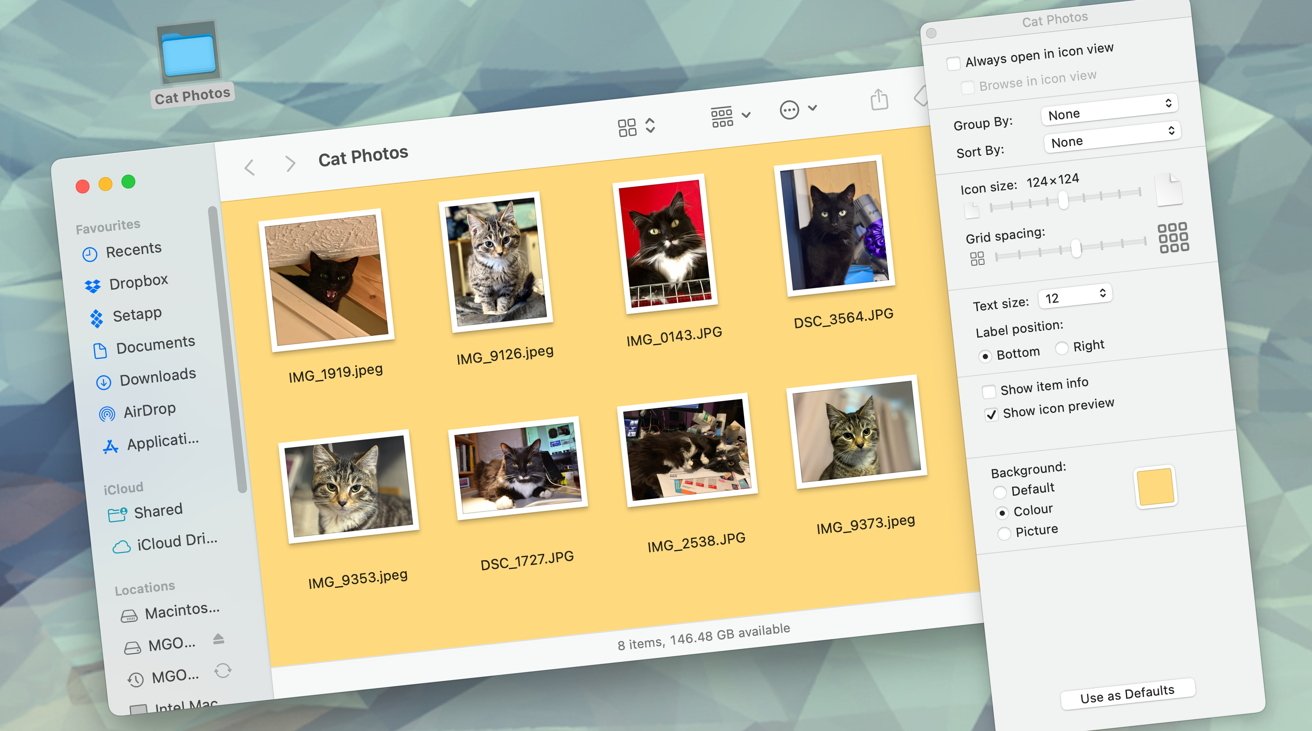Most Mac users know familiar Finder window backgrounds, but few know you can also set Finder window backgrounds to any color you like. Here's how to do it.

You can change the background color of Finder windows.
When you open a folder on the macOS desktop in the Finder, a window opens representing the contents of the folder.
You can view the folder in several ways by using the View menu in the Finder's menu bar at the top of the display.
The Finder lets you view folder contents by icons, list, columns, galleries, or by groups.
You can also sort Finder folders by using the Sort By submenu. There are a variety of other view options on the View menu as well.
There are view options for showing/hiding the toolbar, tabs, a side preview, and entering fullscreen.
If you view a Finder window by list or by groups, the Finder automatically draws blue and white alternating horizontal lines to make items easier to read.
If you select Show View Options from the View menu, Finder presents a small floating window that lets you set a host of additional options such as which file metadata to display, text and icon size, default sorting and grouping, and folder sizes.
Select "Show View Options" from the "View" menu in Finder.
The View Options window always floats above other windows because it has a flag set in the Finder's application bundle that tells the Finder to make it a utility window that floats above all other windows.
Using the View Options window, you can set various folder window options, including metadata, and the default window view for all subsequent Finder windows you open.
The View Options window in Finder.
Folder backgrounds
However, if you open the View Options window, then switch a Finder folder to View->as Icons, you'll notice the bottom part of the View Options window changes to Background:
View as Icons to get the Background pane in the View Options window.
In the Background: pane you can select one of three options:
- Default
- Color
- Picture
If you leave the Default button selected, the folder will display its usual blank background when in icon view.
But if you click the Color button, you get a small color well to the right of the button. If you click on the color well, you get the standard macOS Color Picker which lets you set a color.
Click the color well to make the Color Picker appear.
Using the Color Picker, you can change the color, the brightness, and the opacity of the window's background. Click in the color wheel, and use the slider to change the color of the background of the window.
Click the color wheel and slider to change the window color.
If you click the icons across the top of the Color Picker's toolbar, you can choose alternate color pickers to use to set a color for the window. In this example, we selected the crayons color picker:
Click the icons at the top of the window to change Color Pickers.
Note that to change a folder window's background color, that folder on the local storage filesystem must be unlocked and have writable permissions. Hence, since macOS Catalina, you can't change the root of the Startup Disk's folder window color since the root of the Startup Disk volume is locked by default in macOS Catalina and later.
Setting images as backgrounds
In the View Options window, if you select the Picture button instead of the Color button, the color well changes to an image well with the message "Drag image here" below it.
If you drag a small PNG or JPG image into the image well from the Finder, that image will be set as the background image for the folder:
Drag an image into the image well to set it as a folder's background image.
Once you've set the folder's background color or image, close the View Options window by clicking the red close button in the upper left corner of the window. Your new folder options and background are now set.
Finder will remember them until you clear the options, or delete the Finder's preferences file in the ~/Library/Preferences folder on the Startup Disk.
Your folder image is set.
Using Finder window background colors and images is an easy way to customize the look of the Finder on your Mac.
This little-known feature has been around in macOS forever - in fact, since the very first version in 2000 when macOS was first released as Mac OS X.

